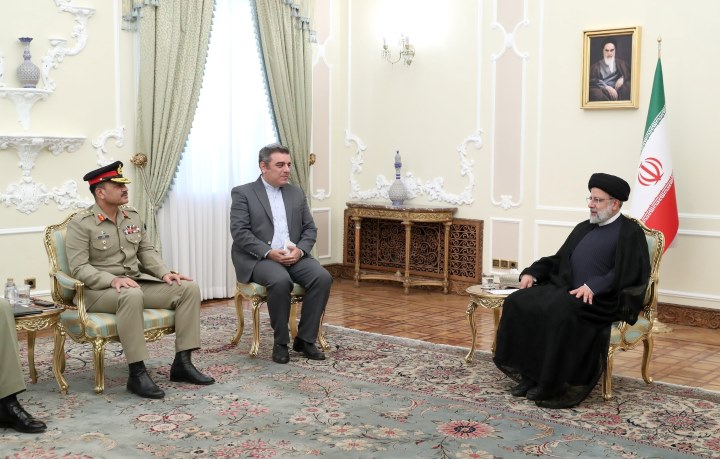

President Ebrahim Raisi and Pakistan's Gen. Asim Munir in Tehran (Photo: @Iran_GOV/Twitter)
Pakistani Chief of the Army Staff General Asim Munir met Iranian President Ebrahim Raisi and the Commander of the Islamic Revolution Guards Corps (IRGC) to diffuse rising tensions along their common border. Gen. Munir faces a tough task as the Pakistan-Iran border is a hotbed of terrorism and smuggling with clashes taking lives of security personnel on both sides.
During their conversation, Raisi stressed on the importance of converting the border into a safe economic zone through energy trade and border markets. In a veiled reference to the United States, he also alluded to efforts by “enemies” to destabilise relations between countries in the region, according to Iran’s official Islamic Republic News Agency (IRNA).
Regarding energy, Iran is keen to establish the Iran-Pakistan pipeline, a truncated version of the Iran Pakistan India (IPI) gas pipeline, which has received a tepid response from New Delhi as the latter does not want its energy security dependent on Islamabad. Iran has established the pipeline infra on its territory with the intent of sourcing gas from its Asaluyeh reserves, but Pakistan’s infrastructure still lies incomplete on its side of territory.
Meanwhile, IRGC chief Gen. Hossein Salami reinforced Raisi’s view that international political forces have created fissures among the Muslim nations in the region. He said: “The IRGC is prepared to work in cooperation with the Pakistani Army to change the security conditions at the border between the two countries and turn them into economic borders”.
In response to Iran’s stress on geo-economics and counter-terror, the Pakistanis seemed to have focused only on the terror aspect.
In a statement, Pakistan’s military public relations agency, the Inter-Services Public Relations (ISPR) said on Sunday: “Military commanders on both sides agreed that terrorism was a common threat to the region in general and both countries in particular”.
General Munir also met with Iranian Foreign Minister Hossein Amir Abdollahian.
Iran which shares its eastern border with Pakistan and Afghanistan has troublesome relations with both countries. With Pakistan, it shares the Baloch conundrum where both nations are battling a strong nationalist upsurge among the community. Baloch groups often target Iranian border guards and escape into Pakistan. Tehran and Islamabad have blamed each other for nurturing separatist groups inimical to the other’s interests.
Tehran has been badly impacted by developments in south-easten province of Zahedan – the capital of Sistan-Baluchistan province, where dozens of Sunni-Baloch people and many IRGC have died in suicide bombings and firing since September 2022. Iran has often blamed Pakistan for the Zahedan violence, indirectly linking up the Jaish-ul-Adl, a Sunni terror group, to Pakistan.
On the other hand instability in Afghanistan has resulted in an influx of refugees, which Iran has been actively pushing back through agreements and sometimes through force. The two nations also disagree on the relocation of battle-hardened Tehreek-e-Taliban (TTP) fighters from the Af-Pak border to Afghanistan northern and other provinces. However, this shifting of fighters is conducive to Islamabad which hopes that deadly assaults on its security personnel will reduce.
With the rift between Iran and Pakistan widening, along with assaults on Shia population in Pakistan adding to the friction, Gen. Munir’s trust-building visit may not have the ballast to reverse the negative tide between Tehran and Islamabad.
The India-UK Comprehensive Economic Trade Agreement (CETA) presents unprecedented opportunities for Indian businesses to expand…
External Affairs Minister Dr S Jaishankar spoke to the newly appointed Foreign Minister of South…
The Indian Space Research Organisation (ISRO) is gearing up for a series of exciting missions.…
The India UN Fund has completed the construction of the historic Niangdo dam in Burkina…
The Taiwan Economic and Cultural Representative Office in Japan has strongly condemned political interference during…
Gati Shakti Vishwavidyalaya in Vadodara, which has been largely focused on logistics in the railway,…